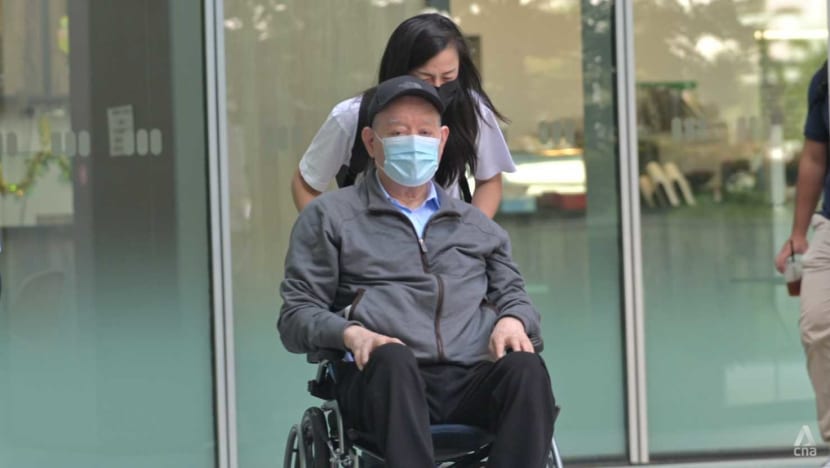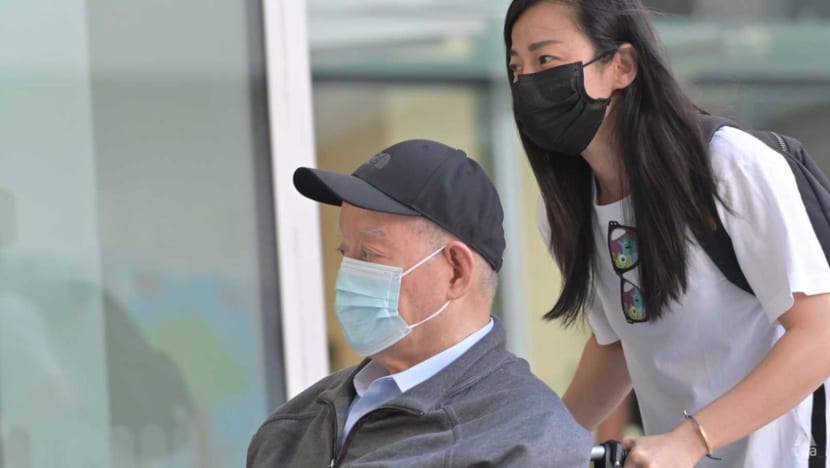Hin Leong oil tycoon OK Lim found guilty in US$111.7 million cheating, forgery trial
OK Lim was still the "big boss" of oil trader Hin Leong and had instructed employees to prepare documents with the intent to deceive HSBC, a judge found.

Hin Leong Trading founder and former oil tycoon Lim Oon Kuin (OK Lim) arriving at the State Courts for his verdict on May 10, 2024. (Photo: CNA/Raydza Rahman)

This audio is AI-generated.
SINGAPORE: The founder of failed oil trading firm Hin Leong Trading was on Friday (May 10) convicted of cheating the Hongkong and Shanghai Banking Corporation (HSBC) and abetting forgery.
Lim Oon Kuin, better known as OK Lim, will return to court for sentencing in October. The 82-year-old is represented by lawyers from Davinder Singh Chambers.
The case involved two bogus transactions for the sale of oil with China Aviation Oil (Singapore) Corporation and Unipec Singapore, and the submission of forged documents that led HSBC to disburse millions of dollars in loans to Hin Leong.
This amounted to at least US$111.7 million (S$150 million), based on the three charges that the prosecution went ahead with out of the more than 100 charges that Lim faced.
The trial, which started last April, centred on who had directed Hin Leong staff to prepare the documents that made it seem like the oil trader had entered into the two purported transactions.
Delivering Friday's verdict, Principal District Judge Toh Han Li found that Lim had directed his employees to forge the documents for the fictitious transactions in March 2020.
The judge also said that Lim had "dishonest intent" in telling his staff to prepare the documents, and that he knew it was not correct to submit a discounting application for a deal that was not done.
Discounting refers to accounts receivable financing, where a seller "sells" unpaid invoices to a financial institution and typically receives a slightly discounted upfront payment, in circumstances where the credit terms for the transaction would mean that the seller would otherwise only receive payment from the buyer at a later date.
If the discounting application was approved, the bank would pay the seller the invoice amount and charge a fee for the transaction.
Lim was the managing director and 75 per cent shareholder of Hin Leong Trading, an oil trading company incorporated in Singapore, at the time of the offences in March 2020.
His defence at trial was that he never instructed staff to submit the discounting applications to HSBC. He claimed to have "slowed down" and delegated matters to colleagues from 2010 due to age. He stepped down in April 2020.
Specifically, for the purported China Aviation Oil deal, Lim denied ever instructing contracts executive Freddy Tan to prepare documents making it seem like the deal had been concluded.
For the purported Unipec deal, Lim also denied asking long-time employee Katherine Ong to submit a discounting application to HSBC, and said he only told her to be "mentally prepared" for such a sale.

The judge rejected these defences. He found that Lim continued to be the "big boss" of Hin Leong even after stepping down in April 2020, that he was "hands on" and that his approval was required for trades.
Judge Toh accepted evidence from Ong that she met with Lim every one to two weeks to update him on Hin Leong's cash flow situation and take instructions, including on invoice discounting.
He rejected Lim's claim that these meetings happened only once a month and lasted "five minutes".
Instead, the judge pointed out that Lim accepted under cross-examination that he kept track of Hin Leong's financial performance, and the objective was for it to be successful and making a profit.
Judge Toh also accepted evidence from prosecution witnesses Tan and Serene Seng, Lim's personal assistant, on Lim's involvement.
Tan consistently said that Lim had asked him to prepare the documents for China Aviation Oil in his statements to the police in 2022.
For the purported Unipec deal, Seng testified that on Mar 19, 2020, Lim told her Hin Leong was close to concluding the deal but wanted to close the accounts receivable first, and asked her to prepare the discounting application.
Seng also said that Lim had asked her to use a different signature to sign on a bill of lading used as a supporting document for the application.
Judge Toh also found that Lim's responses to police questioning were inconsistent with the defence's position that Lim had poor memory and was unable to concentrate when his statements were taken.
These statements included Lim's answer when police asked if he had instructed staff to submit forged sales contracts to Hin Leong's treasury department.
Lim replied that he had asked staff to prepare the contracts with China Aviation Oil and Unipec and submit them because Hin Leong was facing margin calls at the time.
"But I think the contracts (were) later cancelled due to some technical problems. We did not plan to cheat banks for financing," Lim told police.
"It is common for oil companies to submit sales contracts to the banks for financing based on verbal confirmations. This is to get faster cash flow," he added.
The prosecution relied on Lim's answer to argue its case, whereas the defence sought to qualify Lim's answer and challenge its reliability during the trial.
The judge found that Lim's response was "nuanced and detailed", and was satisfied it was captured accurately by the investigative officer.
Judge Toh also accepted evidence from HSBC staff that if they had known the two underlying transactions were bogus, they would not have approved the discounting applications.
Lim remains out on S$4 million bail. He, his son Evan Lim Chee Meng and daughter Lim Huey Ching are also defendants in a civil suit brought by liquidators seeking US$3.5 billion.
Hin Leong, founded in 1973, was one of Asia's largest oil traders before its collapse.
The company filed for insolvency on Apr 17, 2020 – the same day Lim stepped down as managing director – and was wound up in March 2021.
The punishment for cheating or abetting forgery for the purpose of cheating is up to 10 years in jail and a fine.













